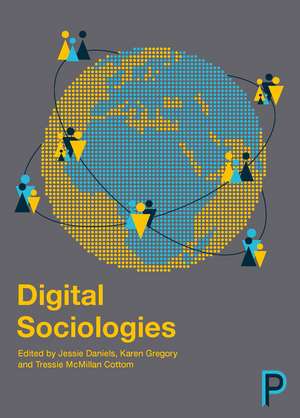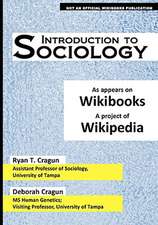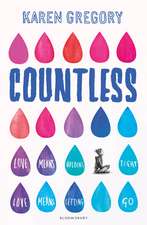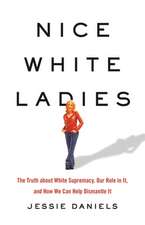Digital Sociologies
Editat de Jessie Daniels, Karen Gregory, Tressie McMillan Cottomen Limba Engleză Paperback – 15 noi 2016
This handbook offers a much-needed overview of the rapidly growing field of digital sociology. Rooted in a critical understanding of inequality as foundational to digital sociology, it connects digital media technologies to traditional areas of study in sociology, such as labor, culture, education, race, class, and gender. It covers a wide variety of topics, including web analytics, wearable technologies, social media analysis, and digital labor. The result is a benchmark volume that places the digital squarely at the forefront of contemporary investigations of the social.
| Toate formatele și edițiile | Preț | Express |
|---|---|---|
| Paperback (1) | 482.12 lei 43-57 zile | |
| Bristol University Press – 15 noi 2016 | 482.12 lei 43-57 zile | |
| Hardback (1) | 899.99 lei 43-57 zile | |
| Bristol University Press – 15 noi 2016 | 899.99 lei 43-57 zile |
Preț: 482.12 lei
Nou
Puncte Express: 723
Preț estimativ în valută:
92.25€ • 96.56$ • 76.78£
92.25€ • 96.56$ • 76.78£
Carte tipărită la comandă
Livrare economică 31 martie-14 aprilie
Preluare comenzi: 021 569.72.76
Specificații
ISBN-13: 9781447329015
ISBN-10: 1447329015
Pagini: 520
Dimensiuni: 171 x 241 x 33 mm
Greutate: 0.84 kg
Editura: Bristol University Press
Colecția Policy Press
ISBN-10: 1447329015
Pagini: 520
Dimensiuni: 171 x 241 x 33 mm
Greutate: 0.84 kg
Editura: Bristol University Press
Colecția Policy Press
Notă biografică
Jessie Daniels is a professor, author and an internationally recognized expert on the Internet manifestations of racism. She is the author of two books about race and various forms of media, as well as dozens of peer-reviewed articles in journals such as New Media & Society, Gender & Society, American Journal of Public Health, and Women's Studies Quarterly. She co-founded Racism Review, with Joe R. Feagin, and was awarded a Ford Foundation grant for JustPublics@365. In 2014, Contexts Magazine profiled her as "Pioneering Digital Sociology. Karen Gregory is a lecturer in Digital Sociology at the University of Edinburgh. Her research focuses on contemporary spirituality, precarity, entrepreneurialism and digital media. Her writings have appeared in Women's Studies Quarterly, Women and Performance, The Journal of Interactive Technology and Pedagogy, and Visual Studies. Karen is the founder of CUNY Graduate Center's Digital Labor Working Group, which was featured in The Atlantic. Tressie McMillan Cottom is a former fellow at the Microsoft Social Media Collective, the Center for Poverty Research at UC-Davis and she serves on the American Sociological Association's "Task Force on Engaging Sociology". Her work has examined education expansion, media, technology and the intersections of race, class and gender. And her publications have appeared in Contexts, Western Journal of Emergency Medicine and Human Affairs as well as edited volumes. Tressie's public sociology has appeared in the New York Times, Washington Post, The Atlantic and NPR. Her blog and social media accounts have numerous citations and awards.
Cuprins
Acknowledgements
Preface
Saskia Sassen
Notes on the authors
Introduction
Karen Gregory, Tressie McMIllan Cottom, and Jessie Daniels
Part I: Digital sociology in everyday life
1 Structure and agency in a digital world
Karen Gregory
2 Beyond digital dualism: Modeling digital community
Alexia Maddox
3 A return to Gemeinschaft: Digital impression management and the sharing economy
Alexandrea J. Ravenelle
4 Digital discourse analysis: Finding meaning in small online spaces
Timothy Recuber
5 Virtually ethical: Ethnographic challenges in researching textile crafters online
Alison Mayne
6 Interactivity, social media, and Superman: How ccomic books can help us understand and conceptualize interactivity online
Harry T. Dyer
7 The digital solidarity trap: Social movement research, online activism, and accessing the other’s others
Theresa A. Hunt
8 Digital Orientalism: TripAdvisor and online travelers’ tales
Trevor Jamerson
Part II Digitized institutions
9 Digitized institutions and inequalities
Tressie McMillian Cottom
10 Toward a digital sociology of school
Neil Selwyn, Selena Nemorin, Scott Bulfin, and Nicola F. Johnson
11 Representing “inforgs” in data-driven decisions
Jeffrey Alan Johnson
12 Employee monitoring in a digital context
Calle Rosengren and Mikael Ottosson
13 Digital sociology’s vocational promise
Stephen R. Barnard
14 Black cyberfeminism: Ways forward for intersectionality and digital sociology
Tessie McMillan cottom
15 Deconstructing racism on college websites
Monita H. Mungo
16 Yakking about college life: Examining the role of anonymous forums on community identity formation
Francesca Tripodi
17 On Thursdays we watch Scandal: Communal viewing and Black Twitter
Apryl McKinney
19 Covert leisure and public spaces: Geocaching in post-9/11 New York City
Jonathan R. Wynn
Part III: Digital bodies
20 Bodies in code
Jessie Daniels
21 Personal data practices in the age of lively data
Deborah Lupton
22 “They’re just too urban”: Black gamers streaming on Twitch
Kishonna L. Gray
23 From “geek” to “chic”: Wearable technology and the woman question
Elizabeth Wissinger
24 Queer Facebook? Digital sociality and queer theory
Benjamin Haber
25 The Ms. Dewey “experience:” Technoculture, gender, and race
Miriam E. Sweeney
26 The Emperor’s new data clothes: Implications of “nudity” as a racialized and gendered metaphor in discourse on personal digital data
Yuliya Grinberg
27 Post your comments below: A case study of immigrant bashing online
Adrian Cruz and Kazuyo Kubo
28 Our mothers have always been machines: The conflation of media and motherhood
Kara van Cleaf
29 #notracist: Exploring racism denial talk on Twitter
Sanjay Sharma and Phillip Brooker
Index
Preface
Saskia Sassen
Notes on the authors
Introduction
Karen Gregory, Tressie McMIllan Cottom, and Jessie Daniels
Part I: Digital sociology in everyday life
1 Structure and agency in a digital world
Karen Gregory
2 Beyond digital dualism: Modeling digital community
Alexia Maddox
3 A return to Gemeinschaft: Digital impression management and the sharing economy
Alexandrea J. Ravenelle
4 Digital discourse analysis: Finding meaning in small online spaces
Timothy Recuber
5 Virtually ethical: Ethnographic challenges in researching textile crafters online
Alison Mayne
6 Interactivity, social media, and Superman: How ccomic books can help us understand and conceptualize interactivity online
Harry T. Dyer
7 The digital solidarity trap: Social movement research, online activism, and accessing the other’s others
Theresa A. Hunt
8 Digital Orientalism: TripAdvisor and online travelers’ tales
Trevor Jamerson
Part II Digitized institutions
9 Digitized institutions and inequalities
Tressie McMillian Cottom
10 Toward a digital sociology of school
Neil Selwyn, Selena Nemorin, Scott Bulfin, and Nicola F. Johnson
11 Representing “inforgs” in data-driven decisions
Jeffrey Alan Johnson
12 Employee monitoring in a digital context
Calle Rosengren and Mikael Ottosson
13 Digital sociology’s vocational promise
Stephen R. Barnard
14 Black cyberfeminism: Ways forward for intersectionality and digital sociology
Tessie McMillan cottom
15 Deconstructing racism on college websites
Monita H. Mungo
16 Yakking about college life: Examining the role of anonymous forums on community identity formation
Francesca Tripodi
17 On Thursdays we watch Scandal: Communal viewing and Black Twitter
Apryl McKinney
19 Covert leisure and public spaces: Geocaching in post-9/11 New York City
Jonathan R. Wynn
Part III: Digital bodies
20 Bodies in code
Jessie Daniels
21 Personal data practices in the age of lively data
Deborah Lupton
22 “They’re just too urban”: Black gamers streaming on Twitch
Kishonna L. Gray
23 From “geek” to “chic”: Wearable technology and the woman question
Elizabeth Wissinger
24 Queer Facebook? Digital sociality and queer theory
Benjamin Haber
25 The Ms. Dewey “experience:” Technoculture, gender, and race
Miriam E. Sweeney
26 The Emperor’s new data clothes: Implications of “nudity” as a racialized and gendered metaphor in discourse on personal digital data
Yuliya Grinberg
27 Post your comments below: A case study of immigrant bashing online
Adrian Cruz and Kazuyo Kubo
28 Our mothers have always been machines: The conflation of media and motherhood
Kara van Cleaf
29 #notracist: Exploring racism denial talk on Twitter
Sanjay Sharma and Phillip Brooker
Index
Recenzii
“Really interesting.”
“In this rather eclectic collection of 29 chapters from 35 authors, the editors attempt to bring to light the potential contributions that sociology may offer to understanding the digital world in which humans now exist. More broadly, however, this is a clarion call to the discipline of sociology to reassert itself as a leader in developing methods to study human lived experience and reexamine its scholarly review processes. The editors warn of wholesale ‘poaching’ of classically trained young sociologists by other academic departments more fully addressing digital existence, and make a strong, impassioned plea for sociology to develop this sub-discipline further—and faster—if it is to remain relevant. This book is a fine first step in addressing these articulated concerns and in laying a framework for areas of future contribution, especially in how structures, institutions, and everyday micro-level interactions are being transformed—and transforming—human existence. Highly recommended.”
“A wealth of scholarship to explore the challenge of digital. The book engages with a range of theoretical questions, including challenging the digital/traditional sociology binary, the role of institutions, digital’s impact on eduction, the racialized practices of Twitch, the meaning of motherhood, the quantified self, the question of the body, and the digital sociological imagination. The eclectic range of scholars, offering perspectives from across the academic life course and deploying examples from across the world, create an important intervention into our understanding of this emerging, and perhaps as a result of this book, established, field of study. Ultimately the book is a call for a new community of scholars to engage with this most important element of contemporary life.”
“In this cutting-edge book, innovative scholars with an impressive array of sociological perspectives probe major dimensions of our increasingly pervasive digital world. . . . A book for all concerned about the digital revolution and the future of global democracy.”
“An in-depth conceptual analysis of everyday life—an invaluable and essential contribution—I highly recommend it.”
“An exciting volume of essays addressing new digital sociologies. . . . Timely and engaging and confront[ing] more conventional sociologies with a new upstart in the field.”
“A comprehensive account of the digital sociology project whose scope is startling in its ambition and which shows how the digital has implications for nearly all sociological topics, questions, and problems.”




















